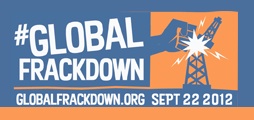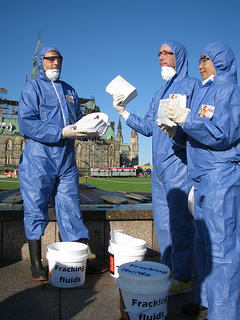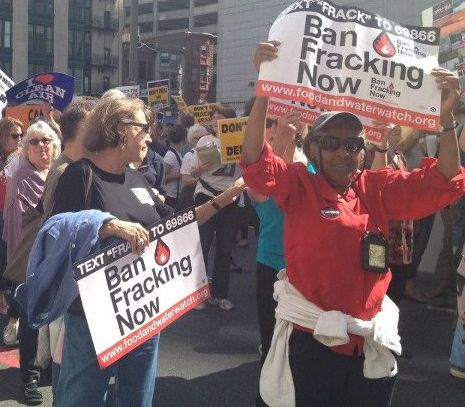Coordinated Actions Worldwide Call for Banning Fracking
Concerned people from the U.S. and numerous other countries will join in a global campaign event Saturday to call for a ban of hydraulic fracturing or "fracking." More than 150 events, on five continents, are planned for this weekend's "Global Frackdown" -- a day of action against fracking -- coupled with the promotion of the expansion of clean, sustainable energy options.
 Concerns about fracking, a process of extracting oil and gas from shale formations, have increased over the past few years as a growing number of communities encounter pressure from the well-funded industry to open up their land and water to industrial drilling. New technologies have made obtaining these deposits cheaper than had been possible in the past, leading to a rapid expansion of fracking across the globe.
Concerns about fracking, a process of extracting oil and gas from shale formations, have increased over the past few years as a growing number of communities encounter pressure from the well-funded industry to open up their land and water to industrial drilling. New technologies have made obtaining these deposits cheaper than had been possible in the past, leading to a rapid expansion of fracking across the globe.
During the process of fracking, large quantities of fresh water, coupled with chemicals and sand, are pumped into shale formations in order to crack the rock and extract the fossil fuels. The blend of "proprietary" chemicals used in this process is largely kept confidential, but studies have revealed that fracking fluids contain a host of toxic substances, including known carcinogens and volatile organic compounds (VOCs). Fracking has the documented potential to contaminate drinking water sources. Fracking has also been shown to foul both air and land -- in addition to spoiling millions of gallons of fresh water as part of the drilling process. Fracking has been a contentious issue in many countries that have large shale deposits, which may be located where people live or set aside as natural wildlife areas or parks.
While communities across the globe continue to fight political or legal battles over the use of land and water for the controversial extraction process, Saturday's day of action will be the first time such efforts are coordinated internationally.
Citizens on Five Continents Call for a Ban
The day of action, spearheaded by Food & Water Watch, has garnered participation of over 150 organizations worldwide. Citizens in Argentina, the Czech Republic, China, Zimbabwe, and the Ukraine, among other nations, will be speaking out on the same day that resisting unlimited fracking is a universal fight.
"Since our water system is deeply interconnected, even if you don't have a fracking rig next to your house, your health, safety and environment are at risk," Anna Ghosh of Food & Water Watch said.
Citizens will converge in front of parliament buildings in Bulgaria, South Africa, and the Czech Republic, at the Golden Gate bridge in San Francisco, and at Noosa Beach in Australia. A brigade of bicycles will protest at the site of an injection well in northern Spain. Street theatre performances portraying the dangers of fracking will be held in downtown Chicago and citizens will hand out information on fracking at Madison's weekly farmers' market on the Capitol building square, among other actions.
Day of Action Follows Protests in Brussels, Philadelphia, and Ottawa
Some of the actions already started this week. On Tuesday, members of Green Parties from across Europe gathered in front of the European Parliament building in Brussels, Belgium, holding murky cups of water along with their protest signs, to represent the threat of water contamination that comes with fracking. The European Union is currently in the process of deciding the future of how the continent will move forward on regulating fracking.
 Photo courtesy of the Council of Canadians.This protest came in part in response to the European Parliament's Industry Committee passing a decision Tuesday that said no environmental regulation amendments are needed to protect citizens from fracking. The European Parliament Environment Committee voted the following day for a more stringent approach to regulation. A European Commission released a report earlier this month calling for strict regulations because of the threat that fracking poses to the health of Europe's residents and its environment.
Photo courtesy of the Council of Canadians.This protest came in part in response to the European Parliament's Industry Committee passing a decision Tuesday that said no environmental regulation amendments are needed to protect citizens from fracking. The European Parliament Environment Committee voted the following day for a more stringent approach to regulation. A European Commission released a report earlier this month calling for strict regulations because of the threat that fracking poses to the health of Europe's residents and its environment.
On Thursday in Ottawa, the Council of Canadians, dressed in hazmat suits, delivered petitions signed by nearly 10,000 people asking for a moratorium on fracking in that country until federal reviews have been completed. The staff carried fake buckets of toxic fracking fluid to deliver along with the petitions. The protesters had hoped to deliver the petitions to Peter Kent, the Minister of the Environment, but the minister never made an appearance.
 "Shale Gas Outrage" in Philadelphia.About one thousand people gathered in Philadelphia Thursday for "Shale Gas Outrage," organized by Protecting Our Waters, a Philadelphia-based nonprofit group. The protestors stood outside the Pennsylvania Convention Center where inside Governor Tom Corbett spoke to attendants of a Marcellus Shale industry conference. At the convention, Corbett called those concerned about fracking the "unreasoning opposition" and touted the industry as the "tip of the spear" of a new industrial revolution. Corbett reportedly received nearly $1 million from those in the oil and gas industry during his gubernatorial campaign.
"Shale Gas Outrage" in Philadelphia.About one thousand people gathered in Philadelphia Thursday for "Shale Gas Outrage," organized by Protecting Our Waters, a Philadelphia-based nonprofit group. The protestors stood outside the Pennsylvania Convention Center where inside Governor Tom Corbett spoke to attendants of a Marcellus Shale industry conference. At the convention, Corbett called those concerned about fracking the "unreasoning opposition" and touted the industry as the "tip of the spear" of a new industrial revolution. Corbett reportedly received nearly $1 million from those in the oil and gas industry during his gubernatorial campaign.
Citizens Standing up to Powerful Industry, Gains Have Been Made
 Martine OuelletThese citizens are up against a powerful, well-funded oil and gas industry with an aggressive public relations campaign to convince the world that fracking is benign. But despite their efforts, victories have been won by citizens hoping to protect their health and the environment from the dangers fracking poses. Fracking has been banned in France, Bulgaria, and the state of Vermont. There are also moratoriums on new fracking wells in New Jersey and New York, as well as in Romania, the Czech Republic, and the German region of North Rhine Westphalia. New York is currently deciding whether to end the state's moratorium on new wells in the state. Around two thousand individuals marched in Albany in August to persuade Governor Andrew Cuomo not to lift the moratorium.
Martine OuelletThese citizens are up against a powerful, well-funded oil and gas industry with an aggressive public relations campaign to convince the world that fracking is benign. But despite their efforts, victories have been won by citizens hoping to protect their health and the environment from the dangers fracking poses. Fracking has been banned in France, Bulgaria, and the state of Vermont. There are also moratoriums on new fracking wells in New Jersey and New York, as well as in Romania, the Czech Republic, and the German region of North Rhine Westphalia. New York is currently deciding whether to end the state's moratorium on new wells in the state. Around two thousand individuals marched in Albany in August to persuade Governor Andrew Cuomo not to lift the moratorium.
Within the first 24 hours of which she was named to cabinet, Quebec's new Natural Resources Minister Martine Ouellet said Thursday that she does not think there is any safe way to extract shale gas. "Our position is very clear: we want a complete moratorium, not only on exploitation but also on exploration of shale gas. We haven't changed our minds," she said.
A full list of events planned for the "Global Frackdown" is available here.





Comments
Fracking
This blind opposition to fracking is misguided. They have been doing it in oil wells for decades. It has not been regulated so some mistakes have been made but you are throwing the baby out with the bathwater. With regulation it can be very safe and can provide a temporary replacement for coal to meet our power needs. Yes, we should work harder on renewables, but this is much better than coal which is causing cancer, asthma, autism and global warming.
You will damage the environment and public health more by being so extreme. Banning fracking is a tragic mistake.
I am an environmentalist and author of a book on alternative energy.
www.clrlight.org
hydraulic fracturing
Labeling yourself an environmentalist, essentially means nothing. I can call myself the Queen of Westchester and it wouldn't mean any more or less. Being the author of a book on alternative energy doesn't qualify you either. What does matter is whether or not you've been paid or influenced to call opposition to fracking "blind opposition" or making a judgement such as "misguided". Scientists who are not on the payroll of companies who stand to profit from fracking, beg to differ with you.
Town wants fracking?
Here is a town in the Southern Tier that "wants" to be fracked.
http://www.youtube.com/watch?v=E0IVHa2IASE&feature=plcp
You be the judge.
Town wants Fracking!
I would like to see each citizen of that town videotaped with their personal opinion as to their wish for fracking. I do not believe the entire town wants this, neither do I believe those that stand to make the most profit will live at ground zero within the fracking areas of this town. How sad that these citizens would not want to leave a better place for their children and the children of the future.